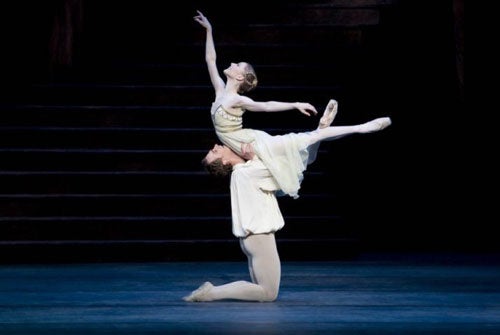Romeo and Juliet, Royal Opera House, London

Your support helps us to tell the story
From reproductive rights to climate change to Big Tech, The Independent is on the ground when the story is developing. Whether it's investigating the financials of Elon Musk's pro-Trump PAC or producing our latest documentary, 'The A Word', which shines a light on the American women fighting for reproductive rights, we know how important it is to parse out the facts from the messaging.
At such a critical moment in US history, we need reporters on the ground. Your donation allows us to keep sending journalists to speak to both sides of the story.
The Independent is trusted by Americans across the entire political spectrum. And unlike many other quality news outlets, we choose not to lock Americans out of our reporting and analysis with paywalls. We believe quality journalism should be available to everyone, paid for by those who can afford it.
Your support makes all the difference.For big productions, ballet companies almost always put on multiple casts. Kenneth MacMillan's Juliet is one of the most coveted roles in the Royal Ballet's repertoire, and one that has always had room for a range of interpretations. This summer's Juliets include debut performances from Marianela Nuñez and Sarah Lamb, two of this company's strongest young principals.
Nuñez, with her bubbly stage presence, is the most distinctive, the most surprising. With her around, the Capulet family lose some of their sternness. She's their baby girl, clearly adored and indulged. Then she meets Thiago Soares's headstrong Romeo, and hits adolescence hard.
Yet the childish confidence lasts a long time. When her cousin Tybalt catches Romeo at the ball, Nuñez runs over to him, absolutely certain that he'll forgive her anything. Her dancing has the same headlong conviction. The ballroom solo is wonderfully giddy: caught up in the moment, Nuñez takes brilliant risks with balance, tilting and swaying as she spins.
This Juliet grows up when Romeo is banished. The family confrontations have a sense of shock on both sides. She's astonished to find she can no longer coax her father round; they're astounded to find so much rage from the family darling. Nuñez goes stiff with adolescent fury – part-grief, part-hormone storm. Refusing Paris, she stands with her hands protectively flat on her pelvis, making this an explicitly sexual rejection.
Soares's Romeo is ardent and involved, partnering surely. His dancing has rough edges that rob this performance of some power. Gary Avis's Tybalt is subtly nuanced, an aggressive man with a soft spot for his cousin. The fight with Martin Harvey's Mercutio was fast and vivid, both men putting some freedom into the click-click-click of this production's swordplay.
Lamb's Juliet is more demure. Her dancing is softer, more romantic, but less driven. She's much more conscious of the weight of family pressure, meeker in her relationship with her parents. She stands quiet and vulnerable in the confrontation scenes, with Capulets raging around her.
Yet she has a quiet self-possession. She kisses Viacheslav Samodurov's Romeo eagerly, then takes a long step back: she knows what she's doing, in kissing him and in breaking away. Samodurov is at his most responsive here, caught up with Lamb's Juliet, surprised by his own emotions. In the wedding scene, he doesn't just hug her but lifts her right up, both of them giggling.
Around these new Juliets, the production has been solidly revived. At the evening performance, the company even got some spontaneity into the conventional first-act brawls, fighting with gusto.
In repertory to 13 June (020-7304 4000)
Join our commenting forum
Join thought-provoking conversations, follow other Independent readers and see their replies
Comments